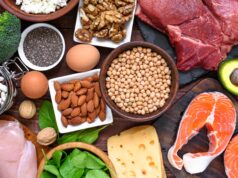Asparagus is a popular vegetable that has been shown to have anti-inflammatory properties. It’s also one of the most common causes of flatulence and bloating in many people.
Asparagus is a vegetable that can cause gas and bloating. It is important to eat the right foods when you have digestive issues.
With this in mind, does asparagus cause bloating?
Asparagus is a powerful anti-bloating vegetable. Sure, it makes your urine smell, but it also makes you urinate, which helps you drain out all that extra water and relieves bloating and pain. According to Sass, it also includes prebiotics, which aid in the development of ‘healthy’ bacteria.
What happens if you consume an excessive amount of asparagus? The dangers of eating asparagus “Eating too much asparagus has no life-threatening adverse effects,” Flores said, “but there may be some unpleasant side effects such as flatulence and a significant odour in the urine.” It’s also possible to have an allergy to asparagus, in which case you shouldn’t eat it, according to her.
As a result, may asparagus induce stomach issues?
According to nutritionist Natalie Olsen, asparagus is a kind of cruciferous vegetable that may induce stomach aches and pains. Some individuals may have trouble digesting these veggies correctly, resulting in bloating. “However, they may induce bloating and other unpleasant stomach problems.
Is zucchini making you feel bloated?
They do, however, contain FODMAPs, which may cause bloating in certain individuals ( 12 ). Cooking cruciferous veggies may help with digestion. What to eat in its place: Spinach, cucumbers, lettuce, sweet potatoes, and zucchini are just a few of the numerous options.
What is the best way to get rid of a bloated stomach?
Long-term solutions for bloating
- Gradually increase your fibre intake. Increased fibre intake may aid in the treatment of bloating.
- Water should be used instead of soda.
- Chewing gum should be avoided.
- Every day, increase your physical activity.
- Consume food at regular intervals.
- Probiotics are a good option.
- Reduce your salt intake.
- Medical problems should be ruled out.
Why do I always feel bloated?
Bloating may be caused by a number of factors. Bloating may be caused by a variety of conditions, including ulcerative colitis, Crohn’s disease, and irritable bowel syndrome. Bloating and a sensation of excess gas in the belly, as well as the medicines used to treat acid reflux, may contribute to belching.
How can you get rid of bloat quickly?
1 Consume foods that are high in potassium. If you’re bloated from too much salt, Cynthia Sass, MPH, RD advises, “the greatest suggestion for quick-ish relief is to drink more water and consume moderate potassium-rich foods like banana, avocado, and sweet potato.” “Water and potassium both aid in the removal of excess salt and moisture from the body.”
Is it true that rice causes bloating?
Despite the fact that white rice is a grain and grains in general tend to make people feel bloated, it does not behave like a grain. Anti-nutrients and sugar starches are in short supply. Brown rice has more anti-nutrients, which may cause bloating and other symptoms of intestinal inflammation.
Why do I become bloated after eating?
Because the body generates gas as it digests food, eating is a frequent cause of bloating. When people eat or drink, they also ingest air, which enters the gastrointestinal system. Bloating may be a sign of a variety of health problems, including irritable bowel syndrome and food intolerance.
Is apple cider vinegar beneficial for bloating?
Apple cider vinegar (ACV) is all the rage when it comes to detoxing (celebrities swear by it), but it may also assist with gas and bloating. Raw ACV is high in enzymes, which help your digestive system work more efficiently. Simply dissolve one tablespoon in a glass of warm water and consume before your next meal.
Do cherries give you gas?
Excess gas is particularly common in apples, apricots, cherries, peaches, pears, plums, and prunes. 5?? Fruit drinks, such as apple juice and pear juice, are also to blame. Fruit (like wheat) contains fructose, which is why.
Is asparagus healthy for your digestive system?
It’s low in calories and high in nutrients like fibre, folate, and vitamins A, C, and K, to name a few. Asparagus also offers a variety of possible health advantages, including weight reduction, better digestion, a healthy pregnancy, and reduced blood pressure.
Is it difficult to digest raw asparagus?
In fact, it may be a healthy addition to your diet even if you don’t prepare it. Cooking asparagus softens the vegetable’s usually stiff plant fibres, making it easier to chew and digest ( 1 ). Raw asparagus, on the other hand, may be simple to chew and just as delicious as any cooked variety with the proper preparation.
Is it harmful to eat asparagus every day?
Increased amounts of free radicals in the body may cause cell damage, which can lead to cancer. Asparagus contains a variety of antioxidants that may aid in the removal of these undesirable chemicals from the body. Scientists have discovered connections between low folate levels and different types of cancer, according to the ODS.
What is it about asparagus that makes your P stink?
Asparagusic acid, a sulfur-rich molecule found in asparagus, seems to be the source of the foul-smelling urine. As your body digests asparagus and breaks down asparagusic acid, volatile components are released, which give asparagus urine its unpleasant odour.
When you eat asparagus, why does your urine smell?
The fragrance of asparagus is believed to be caused by the conversion of asparagusic acid, a sulfur-containing molecule present in asparagus, into other sulfur-containing compounds including methanethiol, the most notable odorant detected in asparagus pee, and many others.
Is it difficult to digest broccoli?
Broccoli and cabbage, for example, contain the same carbohydrates that make beans gassy. Their high fibre content may make them difficult to digest. Cooking them rather than eating them raw will be gentler on your tummy.
Which veggies are the healthiest?
The World’s 14 Healthiest Vegetables
- Spinach. Because of its excellent nutritional content, this leafy green ranks first among the healthiest vegetables.
- Carrots. Carrots are high in vitamin A, with one cup (128 grammes) delivering 428 percent of the daily required amount (4).
- Broccoli.
- Garlic.
- Brussels Sprouts are a kind of sprout.
- Kale.
- Peas, green
- Swiss Chard is a kind of Swiss chard.
Is it true that asparagus makes it difficult to pee?
You may have observed that your urine has an unpleasant odour after eating asparagus. Asparagus pee is the term for when this occurs as a result of the metabolism of asparagusic acid.
Is asparagus harmful to the kidneys?
Blood pressure that is too high. According to preliminary studies, ingesting asparagus root and parsley leaf pills did not lower blood pressure. Additionally, it has the potential to raise the risk of adverse effects such as stomach discomfort, renal pain, and edoema.
Is asparagus safe for dogs to eat?
Asparagus is non-toxic to dogs, so they may eat it without worry. However, there are a few things to consider before giving asparagus to your dog. If your dog vomits, has gas, or has diarrhoea after eating raw asparagus, try gently boiling it next time before feeding it to him.
Are brussel sprouts good for you?
Brussels sprouts are high in fiber, vitamins, minerals and antioxidants, making them a nutritious addition to your diet. They may also come with added health benefits, including the potential to reduce the risk of cancer, decrease inflammation and improve blood sugar control.
The does asparagus cause gas in babies is a question that has been asked for years. There are many different opinions, but the answer is no.
Frequently Asked Questions
Is asparagus hard on your stomach?
Asparagus is not hard on your stomach.
What happens when you eat too much asparagus?
When you eat too much asparagus, your urine will smell like a spring.
Is asparagus bad for bloating?
Asparagus is not bad for bloating.
Related Tags
- list of foods that cause gas and bloating
- foods that cause gas in adults
- does asparagus cause gas breastfeeding
- does asparagus cause smelly gas
- does cheese cause gas



